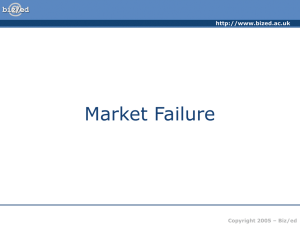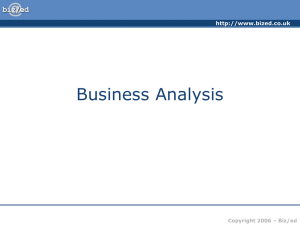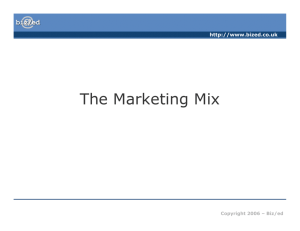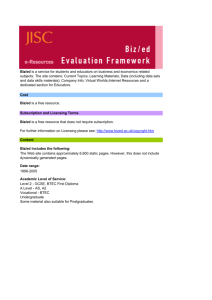Market Research - PowerPoint Presentation
advertisement
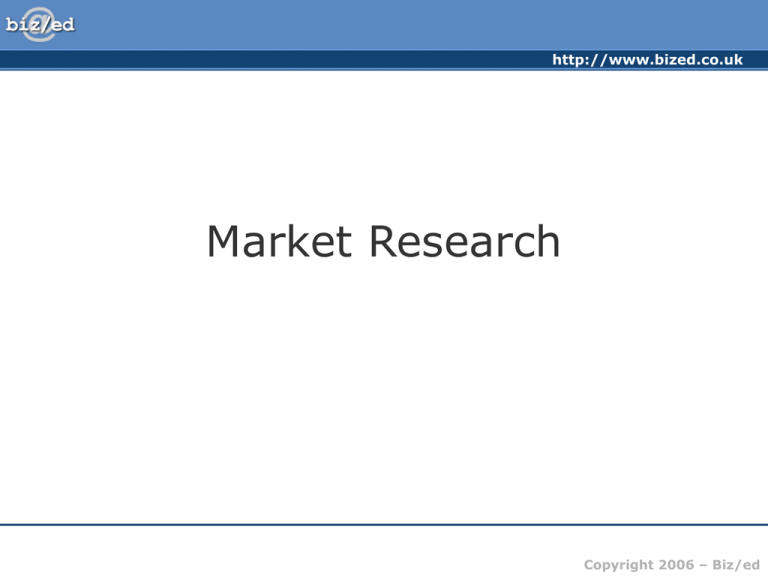
http://www.bized.co.uk Market Research Copyright 2006 – Biz/ed http://www.bized.co.uk Market Research Copyright 2006 – Biz/ed http://www.bized.co.uk Secondary Research Copyright 2006 – Biz/ed http://www.bized.co.uk Internal Sources • • • • Company Accounts Internal Reports and Analysis Stock Analysis Retail data - loyalty cards, till data, etc. Copyright 2006 – Biz/ed http://www.bized.co.uk External Sources • • • • • • • • Government Statistics (ONS) EU - Euro Stat Trade publications Commercial Data - Gallup, Mintel, etc. Household Expenditure Survey Magazine surveys Other firms’ research Research documents – publications, journals, etc. Copyright 2006 – Biz/ed http://www.bized.co.uk Sampling Methods Copyright 2006 – Biz/ed http://www.bized.co.uk Market Research • Sampling Methods: • Random Samples – equal chance of anyone being picked – May select those not in the target group – indiscriminate – Sample sizes may need to be large to be representative – Can be very expensive Copyright 2006 – Biz/ed http://www.bized.co.uk Market Research • Stratified or Segment Random Sampling – Samples on the basis of a representative strata or segment – Still random but more focussed – May give more relevant information – May be more cost effective Copyright 2006 – Biz/ed http://www.bized.co.uk Market Research • Quota Sampling – Again – by segment – Not randomly selected – Specific number on each segment are interviewed, etc. – May not be fully representative – Cheaper method Copyright 2006 – Biz/ed http://www.bized.co.uk Market Research • Cluster Sampling – Primarily based on geographical areas or ‘clusters’ that can be seen as being representative of the whole population • Multi-Stage Sampling – Sample selected from multi-stage sub-groups • Snowball Sampling – Samples developed from contacts of existing customers – ‘word of mouth’ type approach! Copyright 2006 – Biz/ed http://www.bized.co.uk Primary Research Copyright 2006 – Biz/ed http://www.bized.co.uk Market Research • Primary Research – – – – First hand information Expensive to collect, analyse and evaluate Can be highly focussed and relevant Care needs to be taken with the approach and methodology to ensure accuracy – Types of question – closed – limited information gained; open – useful information but difficult to analyse Copyright 2006 – Biz/ed http://www.bized.co.uk Market Research • Quantitative and Qualitative Information: • Quantitative – based on numbers – 56% of 18 year olds drink alcohol at least four times a week doesn’t tell you why, when, how • Qualitative – more detail – tells you why, when and how! Copyright 2006 – Biz/ed http://www.bized.co.uk Purpose Copyright 2006 – Biz/ed http://www.bized.co.uk Market Research • Advantages of Market Research – Helps focus attention on objectives – Aids forecasting, planning and strategic development – May help to reduce risk of new product development – Communicates image, vision, etc. – Globalisation makes market information valuable (HSBC adverts!!) Copyright 2006 – Biz/ed http://www.bized.co.uk Market Research • Disadvantages of Market Research – Information only as good as the methodology used – Can be inaccurate or unreliable – Results may not be what the business wants to hear! – May stifle initiative and ‘gut feeling’ – Always a problem that we may never know enough to be sure! Copyright 2006 – Biz/ed



